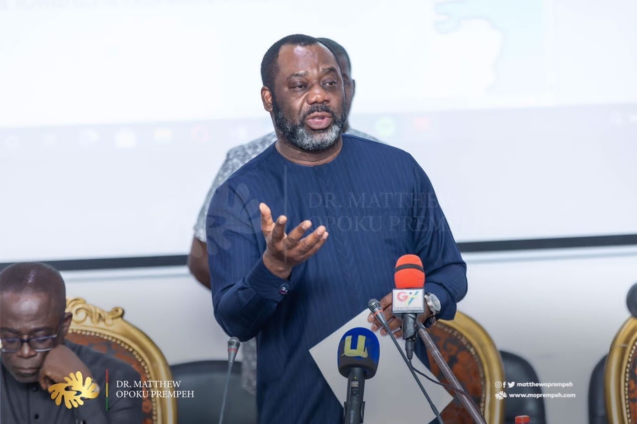Ghana’s National Energy Transition plan is gaining momentum as the ministries of Transport and Energy commit to its implementation.
In a bid to maximize its advocacy, a joint delegation from the two ministries have been meeting with the National House of Chiefs in Kumasi.
The consultative meeting sought to solicit inputs from the traditional leaders towards the implementation of Ghana’s transitioning to GrEEn energy.
The National Energy Transition Plan seeks to transition the use and patronage of high carbon emitting sources to cleaner ones to attain a net-zero target.
Acknowledging the deteriorating effects of fossil fuel energy, Energy Minister, Dr. Matthew Opoku Prempeh indicated the policy would mitigate the effects of global warming.
“The rainfall patterns are changing because of nothing, but global warming.
“Food security, job security and human existence or life are under threat,” he said.
In 2014, fossil fuel energy consumption in Ghana stood at 52.5% with an average annual rate of 5.83%.
Out of the 2.8 million registered vehicles in Ghana, data available at the DVLA indicates 72% use petrol with 27% and less than 1% harnessing diesel and LPG respectively.
Deputy Transport Minister, Frederick Adom, indicated that the government is introducing eco-friendly public transits and policies to avoid the impact of the 1.5°C global warming.
“As a ministry in charge of Transport, we remain resolute and committed to promote and sustain environmentally friendly, responsive transport systems. It’s perhaps one of the most urgent and critical measures that can guarantee a net-zero future.
“Our focus is on technological shift away from petrol and diesel fuels to a more fine alternative. We’re currently developing an e-mobility policy to guide the deployment and scale-up of electric vehicles in the country,” he said.
With almost a near end to the Sustainable Development Goals, Ghana’s commitment to SDG7 appears to be bleak.
Some residents have been reacting to the government’s introduction of clean and affordable energy.
Kwame, a phone accessories vendor, lauded the initiative, indicating that it would salvage the crippling economy.
“Trying to curb the impacts of carbon emission which is gradually depleting the ozone layer and causing more harm to the environment, I think this is a good idea,” he said.
They are however admonishing the government to build more electric pump stations should this policy kickstart.
“This would help reduce the unbearable atmospheric heat. The government should build more of the electric stations within a few meter intervals to power these vehicles,” Benjamin, a driver, added.
The National Energy Transition Plan is on the theme; "Moving Ghana Towards a net-zero future".
Latest Stories
-
Kinshasa to host first World Music and Tourism Festival, celebrating rumba
7 minutes -
Today’s Front pages: Friday, June 27, 2025
23 minutes -
COVID-19 remains a threat – GHS cautions public
1 hour -
Renewed clashes in Nkwanta South leave one dead, several injured
1 hour -
Delay not intentional, let’s maintain good faith – Ayew Afriyie appeals to GRNMA
2 hours -
Ghana makes significant improvement in the 2025 World Competitiveness Report
2 hours -
Local Government Ministry to pilot 24-Hour Economy market
2 hours -
Parliament restores July 1 as Republic Day holiday
2 hours -
Global Summit: World leaders recommit to immunisation amid global funding shortfalls
2 hours -
No further postponements after July 10 – GRNMA warns
2 hours -
US-based Ghanaian petitions Acting CJ over alleged judicial misconduct in land dispute
2 hours -
Farmer punished for stealing assorted items from students
2 hours -
Telecel Ghana expands community footprint in Kumasi with 3 new shops
2 hours -
Decomposing body of 71-year-old retired teacher found in well
2 hours -
I will marshal every effort to answer my removal process — Justice Torkornoo
2 hours

